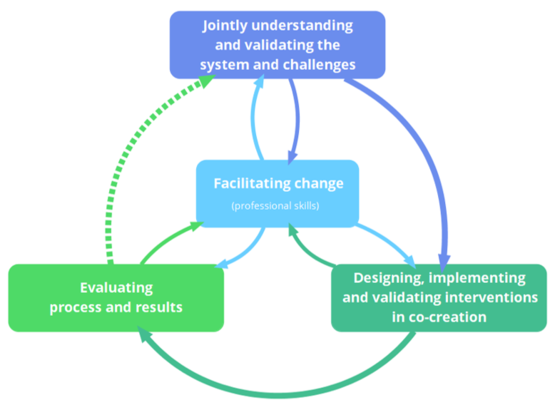LC 00140: verschil tussen versies
Geen bewerkingssamenvatting |
Geen bewerkingssamenvatting |
||
| Regel 13: | Regel 13: | ||
Lessons learned are shared, and ideally are added to a Body of Knowledge and Skills.[[Bestand:Facilitating change visual EN.png|gecentreerd|miniatuur|550x550px|'''Figure 1:''' The process of guiding socially desirable changes.|koppeling=https://projectenportfolio.nl/wiki/index.php/Bestand:Facilitating_change_visual_EN.png]] | Lessons learned are shared, and ideally are added to a Body of Knowledge and Skills.[[Bestand:Facilitating change visual EN.png|gecentreerd|miniatuur|550x550px|'''Figure 1:''' The process of guiding socially desirable changes.|koppeling=https://projectenportfolio.nl/wiki/index.php/Bestand:Facilitating_change_visual_EN.png]] | ||
===Further reading=== | ===Further reading=== | ||
*European Network of Living Labs: {{External link|resource=Resource Hyperlink 00339|name=ENoLL|dialog=process-linkwebsite-dialog}} | *European Network of Living Labs: {{External link|resource=Resource Hyperlink 00339|name=ENoLL|dialog=process-linkwebsite-dialog}} | ||
Versie van 30 sep 2021 12:01
Definition and requirements
[ Definition ]
A Living Lab is a concrete user-centered, open-innovation and research setting in which stakeholders with different backgrounds, interests, views and expertise interdisciplinary and through dialogue continuously collaborate and jointly learn (they co-create, or even "co-evolve") to create movement and adaptively find desired and sustainable improvements for complex, social challenges.
[ Requirements of working and learning in Living Labs ]
There is a program of societal challenges (e.g. a research program) that is being worked on in Living Labs. In a Living Lab stakeholders approach the challenge from a systems thinking perspective (see figure 1). They can try to understand what is at stake, they can formulate a shared goal to improve the challenging situation, they can and determine the boundaries of the Living Lab: what is and is not included in it, and why? Stakeholders can reflect critically on the content and process of the challenge itself, the "group learning" process and the individual role. This leads to validated awareness of the challenge.
In a Living Lab stakeholders can jointly and continuously search for widely supported and sustainable improvements, in which the stakeholders take both their joint and individual responsibilities and play their own, specific roles. This leads to trust and connection.
In a Living Lab there is no such construction of client-contractor. Students are future Facilitators of Change - our future colleagues. They can take their role in the form of master-apprentice.
Lessons learned are shared, and ideally are added to a Body of Knowledge and Skills.
Further reading
- European Network of Living Labs: ENoLL
- Intercultureel werken in Living Labs
- Handreiking innovatiewerkplaatsen
- Co-creation in living labs (article, in Dutch)

